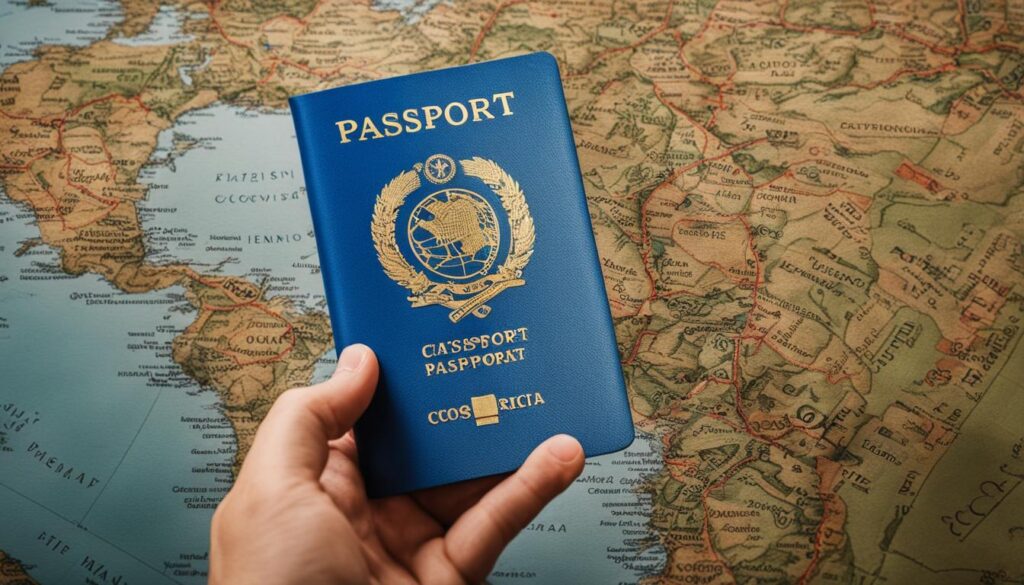At the forefront of property financing in Costa Rica, GapInvestments.com stands as a beacon for…

Understanding Costa Rica Citizenship for Those Born Abroad
Costa Rican citizenship is a valuable status that can be acquired through birth or naturalization. For those born abroad, eligibility for Costa Rican citizenship depends on certain criteria that must be met. This article explores the requirements and processes involved in obtaining Costa Rican citizenship for those born abroad.
Key Takeaways:
- Costa Rican citizenship can be acquired through birth or naturalization.
- Those born abroad to at least one Costa Rican parent can register their birth and obtain Costa Rican citizenship.
- Dual nationality is allowed in Costa Rica.
- The naturalization process requires meeting specific requirements, including domicile, income, language proficiency, and knowledge of Costa Rican history and culture.
- Costa Rican citizenship offers benefits such as indefinite stay, access to social welfare programs, and the right to vote in Costa Rican elections.
Costa Rica Citizenship Application Process
To acquire Costa Rican citizenship, individuals can go through the naturalization process. This process involves meeting specific requirements and demonstrating a commitment to Costa Rican society and culture. Here are the key steps involved in the Costa Rica citizenship application process:
Gather Required Documents
First, applicants must gather all the necessary documents needed for the citizenship application. These documents typically include proof of identity, such as a valid passport or national ID card, as well as proof of residency in Costa Rica, such as utility bills or rental agreements. Additionally, applicants will need to provide documentation to demonstrate their proficiency in the Spanish language and knowledge of Costa Rican history and culture.
Submit Application and Pay Fees
Once all the required documents are gathered, applicants can submit their citizenship application to the relevant authorities. The application forms can typically be obtained from the Costa Rican immigration office or consulate. Along with the application, applicants will need to pay the required fees, which vary depending on the individual’s circumstances and the type of application being submitted.
Attend Interviews and Examinations
After submitting the application, applicants may be required to attend interviews and examinations to assess their suitability for Costa Rican citizenship. These interviews and exams may include language proficiency tests, cultural knowledge assessments, and interviews to evaluate the applicant’s character and commitment to becoming a Costa Rican citizen.
Wait for Approval
Once the application, interviews, and examinations are completed, applicants must wait for the decision on their citizenship application. The processing time can vary, but it is important to note that the approval is at the discretion of the Costa Rican authorities. If the application is approved, the applicant will receive a certificate of naturalization, officially granting them Costa Rican citizenship.
Acquiring Costa Rican citizenship through the naturalization process requires careful preparation, adherence to the requirements, and patience throughout the application process. By following the necessary steps and providing all the required documentation, individuals can navigate the Costa Rica citizenship application process and work towards becoming a Costa Rican citizen.
Benefits and Challenges of Costa Rican Citizenship for Those Born Abroad
Costa Rican citizenship for foreign-born individuals offers a range of benefits and opportunities. One of the primary advantages is the ability to enter and stay in Costa Rica indefinitely. This grants individuals the freedom to live, work, and enjoy the many attractions and natural wonders of the country. Additionally, Costa Rican citizens have access to social welfare programs, including healthcare and education, ensuring a high quality of life.
Another significant benefit of Costa Rican citizenship for those born abroad is the right to vote in Costa Rican elections. This provides an opportunity to actively participate in the democratic process, shaping the future and policies of the nation. It is a meaningful way for individuals to contribute to the development and progress of Costa Rica.
However, there may be challenges that individuals born abroad should consider. Language barriers can pose difficulties, as the official language of Costa Rica is Spanish. While many Costa Ricans speak English, having a basic understanding of Spanish can greatly enhance communication and integration into society. Furthermore, adjusting to a new culture and understanding the legal system may require time and effort.
It is important to note that dual citizens are treated as Costa Rican citizens when in Costa Rica. This means that individuals with Costa Rican citizenship through descent have the same rights and responsibilities as any other citizen of the country. However, specific procedures, such as obtaining Costa Rican departure authorization, may be required when entering or leaving the country.

Summary:
- Costa Rican citizenship for foreign-born individuals offers the ability to live and work in Costa Rica indefinitely.
- Access to social welfare programs, such as healthcare and education, is available to Costa Rican citizens.
- The right to vote in Costa Rican elections allows individuals to actively participate in shaping the nation’s future.
- Challenges may include language barriers, cultural adjustments, and understanding the legal system.
- Dual citizens are treated as Costa Rican citizens within the country, with specific procedures for entering and leaving Costa Rica.
Table: Benefits and Challenges of Costa Rican Citizenship for Those Born Abroad
| Benefits | Challenges |
|---|---|
| Ability to enter and stay in Costa Rica indefinitely | Language barriers |
| Access to social welfare programs | Cultural adjustments |
| Right to vote in Costa Rican elections | Understanding the legal system |
Conclusion
Acquiring Costa Rican citizenship for those born abroad is a process that involves birthright or naturalization. Whether born in Costa Rica to Costa Rican parents or born abroad to at least one Costa Rican parent, individuals have the opportunity to obtain Costa Rican citizenship. The application process requires meeting specific requirements and demonstrating a commitment to Costa Rican society and culture.
By establishing a domicile in Costa Rica, having a profession or sufficient sources of income, and showing good conduct, adult applicants can apply for naturalization. They must also possess knowledge of the Spanish language and Costa Rican history and culture. The application can be made through the Options and Naturalizations Act, which outlines the requirements based on the applicant’s circumstances.
Costa Rican citizenship for those born abroad comes with numerous benefits. It grants the ability to enter and stay in Costa Rica indefinitely, access to social welfare programs, and the right to vote in Costa Rican elections. However, there may be challenges to consider, such as language barriers, cultural adjustments, and navigating the legal system.
With the guidance of Costa Rica Immigration Experts, individuals born abroad to Costa Rican parents can navigate the citizenship process successfully. By understanding the responsibilities and challenges that come with Costa Rican citizenship, applicants can embark on their journey towards obtaining Costa Rican citizenship and enjoy the benefits it offers.
FAQ
How can I acquire Costa Rican citizenship if I was born abroad?
Costa Rican citizenship can be acquired if you were born abroad to at least one Costa Rican parent who has registered your birth. You can do this by either registering the birth at the Costa Rican consulate or bringing a birth certificate, apostilled or legalized, to the Civil Registry in Costa Rica.
Can I have dual nationality as a Costa Rican citizen?
Yes, dual nationality is allowed in Costa Rica. If you acquire Costa Rican citizenship, you can retain your previous nationality as well.
What are the requirements for naturalization as a Costa Rican citizen?
To become a naturalized Costa Rican citizen, you must establish a domicile in Costa Rica, have a profession or sufficient sources of income, demonstrate good conduct, and have knowledge of the Spanish language and Costa Rican history and culture. Specific requirements may vary based on your circumstances.
What are the benefits of Costa Rican citizenship for those born abroad?
Costa Rican citizenship for those born abroad offers numerous benefits, including the ability to enter and stay in Costa Rica indefinitely, access to social welfare programs, and the right to vote in Costa Rican elections.
Are there any challenges to acquiring Costa Rican citizenship for those born abroad?
Some challenges may include language barriers, cultural adjustments, and understanding the legal system in Costa Rica. It’s important to be prepared for these challenges and seek guidance if needed.
How can Costa Rica Immigration Experts assist me in obtaining Costa Rican citizenship?
Costa Rica Immigration Experts can provide guidance and assistance throughout the citizenship application process. They have the knowledge and expertise to help individuals born abroad to Costa Rican parents navigate the requirements and successfully obtain Costa Rican citizenship.


